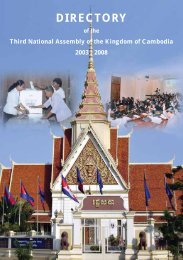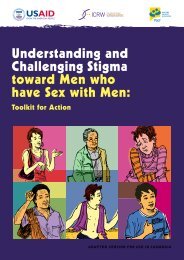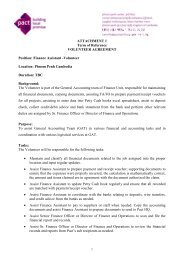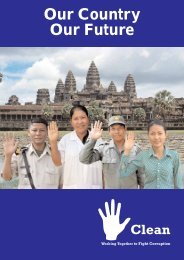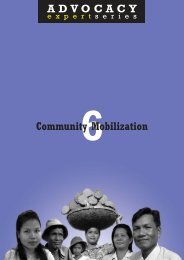Advocacy in Cambodia: Increasing Democratic ... - Pact Cambodia
Advocacy in Cambodia: Increasing Democratic ... - Pact Cambodia
Advocacy in Cambodia: Increasing Democratic ... - Pact Cambodia
Create successful ePaper yourself
Turn your PDF publications into a flip-book with our unique Google optimized e-Paper software.
Case Studies<br />
Lobby<strong>in</strong>g<br />
As part of their strategy, NGO representatives<br />
meet <strong>in</strong>itially with district authorities to open a<br />
channel of communication between them and<br />
community committees. After NGOs have<br />
facilitated the first meet<strong>in</strong>gs, staff will usually<br />
withdraw from the process and encourage<br />
community leaders to network on their own. Some<br />
urban development NGOs refra<strong>in</strong> from attend<strong>in</strong>g<br />
any meet<strong>in</strong>gs between communities and district<br />
authorities, <strong>in</strong> order to avoid creat<strong>in</strong>g community<br />
dependence on the NGO.<br />
NGO staff <strong>in</strong>teract with government staff at<br />
all levels, <strong>in</strong>clud<strong>in</strong>g sangkat, khan, and the<br />
Municipality, and generally request meet<strong>in</strong>gs to<br />
advocate for the delay of evictions and to f<strong>in</strong>d other<br />
appropriate solutions to problems fac<strong>in</strong>g<br />
community members.<br />
NGOs also use the UNCHS weekly meet<strong>in</strong>g<br />
with the Phnom Penh Mayor as an opportunity to<br />
advocate on particular issues. Experience <strong>in</strong>dicates<br />
that <strong>in</strong> order for advocacy efforts to be successful,<br />
it is important to have high-profile people<br />
<strong>in</strong>volved, such as the NGO director. It is also<br />
important to do advocacy on a cont<strong>in</strong>uous basis<br />
and not wait for disasters such as fires.<br />
Media<br />
When communities from Bondoh Vichea<br />
were barred from rebuild<strong>in</strong>g their shelters, they<br />
demonstrated <strong>in</strong> front of the Prime M<strong>in</strong>ister’s<br />
house. Though urban-focused NGOs had not been<br />
<strong>in</strong>itially aware that the media could help their<br />
cause, staff observed journalists cover<strong>in</strong>g the<br />
demonstration and read the article that was<br />
subsequently published. The demonstration<br />
generated significant publicity and this experience<br />
helped NGOs to understand the importance of the<br />
media. Now NGO staff carries journalists’<br />
telephone numbers with them and contact them<br />
as soon as they learn about a crisis.<br />
Some urban NGOs produce newsletters that<br />
they distribute to communities, municipal<br />
officials, NGOs, and local authorities. Publications<br />
serve to <strong>in</strong>form municipal authorities of problems<br />
that arise. Though most NGOs who<br />
produce newsletters do so<br />
<strong>in</strong>dependently, a s<strong>in</strong>gle sectoral<br />
publication that presents articles from<br />
various organizations would likely carry<br />
more weight.<br />
Impact of <strong>Advocacy</strong> Activities<br />
Policy/Program Changes<br />
At the implementation level, NGOs<br />
and urban committees have made<br />
progress <strong>in</strong> negotiat<strong>in</strong>g improvement projects with<br />
district authorities that deal with communities on<br />
a case-by-case basis. Some NGO staff feel that<br />
district authorities are beg<strong>in</strong>n<strong>in</strong>g to listen to and<br />
cooperate with NGOs. In some communes,<br />
however, no amount of strategiz<strong>in</strong>g can encourage<br />
authorities to cooperate with poor communities<br />
and sometimes authorities even create obstacles<br />
when deal<strong>in</strong>g with poor communities.<br />
Overall, development agencies suggest that<br />
there has been a shift from a gradual improvement<br />
<strong>in</strong> the attitude of the municipal government<br />
through 1999, to an <strong>in</strong>creas<strong>in</strong>gly hard-l<strong>in</strong>e stance<br />
of relocat<strong>in</strong>g people onto unprepared sites, as<br />
highlighted after the Bondos Vichea fires. After the<br />
fires, NGOs had a few meet<strong>in</strong>gs with the<br />
Municipality, but the Municipality tended to treat<br />
NGOs as potential donors rather than<br />
collaborators. That the Municipality provided<br />
supplies and materials to victims at all is viewed<br />
as its strategy to appease fire victims and deflect<br />
criticism.<br />
Possible reasons for the Municipality’s<br />
<strong>in</strong>creas<strong>in</strong>gly tough stance may be that it sees the<br />
bottom-up approach as be<strong>in</strong>g too fragmented and<br />
slow, or that it creates <strong>in</strong>dependent entities that<br />
may criticize the government <strong>in</strong> the future.<br />
Whatever the case, the Municipality’s<br />
management style is perceived as be<strong>in</strong>g top-down,<br />
with some city officials act<strong>in</strong>g as if the city does<br />
not <strong>in</strong>clude poor communities. The Municipality<br />
has many problems to address and the urban poor<br />
seem to be low on their list of priorities.<br />
Very little success has occurred relat<strong>in</strong>g to<br />
urban poor policy formulation or change.<br />
Authorities will cont<strong>in</strong>ue to evict poor<br />
communities that will eventually move to other<br />
locations <strong>in</strong> the city despite <strong>in</strong>itial relocation areas<br />
set up by the municipality outside the city. Longterm<br />
policies that address the urban poor’s rights<br />
need support from NGOs and authorities to help<br />
resolve the urban poor’s plight.<br />
Enlarg<strong>in</strong>g the <strong>Democratic</strong> Space<br />
Some progress has been made at the local<br />
When 11 banks closed <strong>in</strong> 2001, many organized urban communities that<br />
had deposited sav<strong>in</strong>gs at one of the closed banks were severely affected.<br />
A number of NGOs came together to form a Depositors Rights Protection<br />
Committee to lobby for the return of part of the money. The group wrote<br />
letters to the M<strong>in</strong>istry of F<strong>in</strong>ance, the National Bank, and the directors of<br />
the closed banks, as well as organized a number of demonstrations. The<br />
committee was ultimately successful <strong>in</strong> gett<strong>in</strong>g the banks to return $500<br />
to depositors as a first step. An additional 15% of funds deposited was<br />
subsequently returned as well.<br />
86



